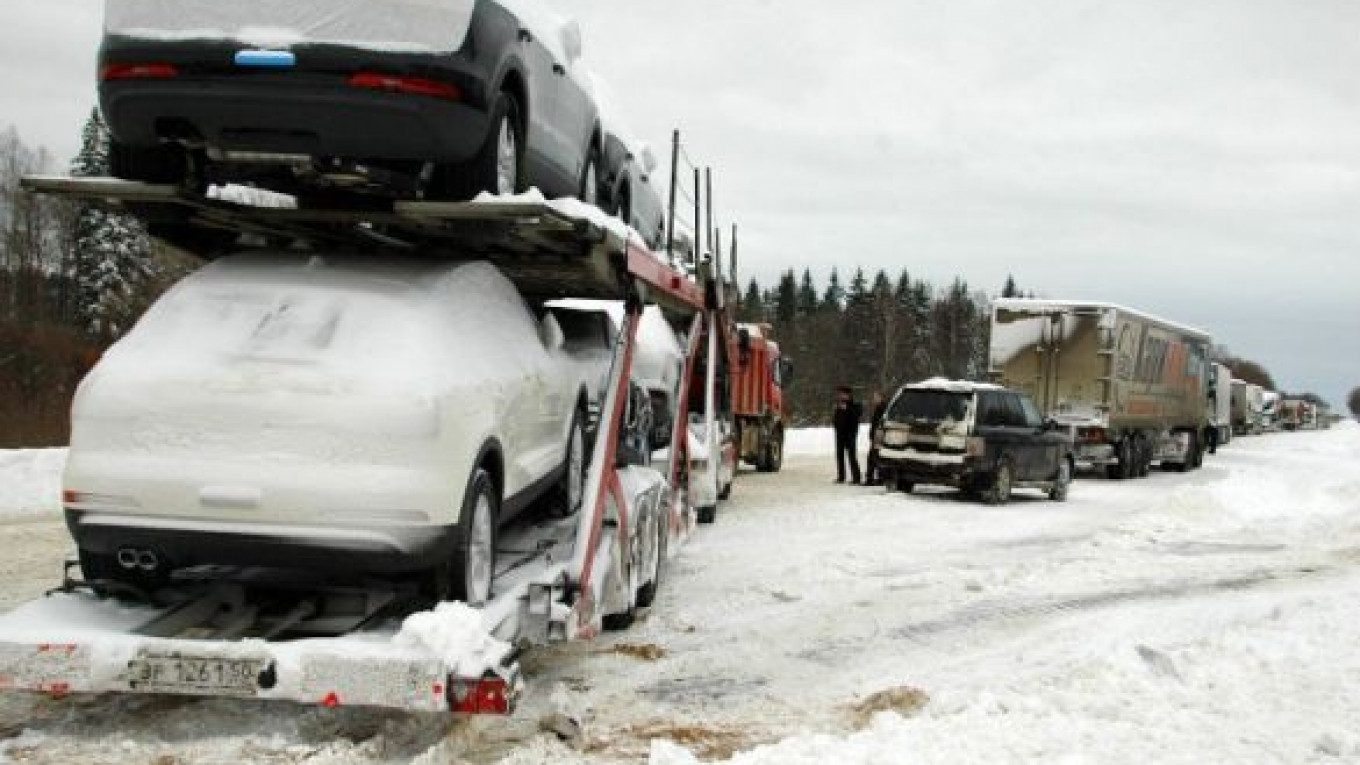Officials on Monday passed around blame for a 70-kilometer traffic jam on a Moscow-St. Petersburg highway that trapped 9,000 drivers over the weekend with scarce food, water and fuel, following heavy snowfall.
Meanwhile, by 5 p.m. Monday, a 40-kilometer stretch of the M10 highway was brought to a near-standstill once again, state radio Vesti FM reported. More congestion is expected with additional heavy snowfall in Tuesday's forecast.
Deputy Prime Minister Dmitry Rogozin blamed the "ineffective work of road services" for the huge traffic jam, adding that some 4,000 trucks and 5,000 other vehicles were stuck in the weekend congestion.
He said almost 200 snow removal machines were deployed to the road after the snowfall but road workers had failed to cover roads with deicing agents in time.
Emergency workers set up 27 assistance areas for warming up and feeding drivers, and helped "4,780 people" during the traffic jam through the Tver region, north of Moscow, Rogozin said. Authorities also organized quick refueling of cars at 20 gas stations and six mobile stations, he said.
"But, of course, the aid didn't arrive in time more often than not, and many drivers were left without food and gas in the middle of the forest," Rogozin said.
"The road, let's put it that way, is not a European one. It's Russian-like, forested, dark and snowed in," he said about the 565-kilometer route, which connects Moscow to St. Petersburg through Tver and Veliky Novgorod.
"So you can imagine the particular level of despair of some drivers," Rogozin said at a regular meeting of Prime Minister Dmitry Medvedev with his deputies Monday, the government website reported.
A number of the road's sections have steep slopes, sharp bends and pass over dams, requiring drivers to be very attentive. The distance between rest areas on the M10 is 25 to 30 kilometers.
Regional emergency workers said in a statement that by 6 a.m. Monday traffic flow had been restored on the highway M10, but hours later the second 40-kilometer jam near the town of Torzhok was reported by state news.
However, the regular speed of traffic flow on the M10 on Monday morning was 40 to 90 kilometers per hour, and buses were traveling as normal, Rogozin said.
Roman Starovoit, head of the Federal Road Agency, said the traffic jam was caused by a road accident amid the heavy snowfall.
Road workers "were coping" with the snowfall until the accident, Starovoit said at an emergency meeting of his subordinates, Interfax reported. Starovoit blamed a "lack of coordination" between various state services for the traffic jam.
Igor Astakhov, head of the road maintenance department at Starovoit's agency, blamed traffic police for the congestion, saying they arrived at the scene of the accident "very late" and failed to direct the traffic to the bypass route — Baltia, Astakhov said at the meeting, Interfax reported.
Starovoit said traffic police should have used the media to inform drivers about the road conditions.
But Vladimir Puchkov, head of the Emergency Situations Ministry, praised traffic police for "quickly" leading buses and motorcars out of the traffic jam by leading them through the oncoming lane by police and fire fighting vehicles.
Puchkov said road workers, not traffic police, should have informed drivers and passengers about the congestion.
Rogozin suggested that truck drivers should be obliged by law to put winter tires on their cars by Nov. 1 and use them until April 1, and be equipped with maneuvering chains and sensing systems for safe driving.
But Pyotr Shkumatov, head of the Blue Buckets driver activist group, said forcing drivers to use winter tires would boost cargo transportation costs and make them slower if drivers have to change tires each time they travel from Russia's north to the south, he told Interfax.
Shkumatov said authorities should instead boost responsibility of officials responsible for road maintenance and install automated systems of covering roads with deicing agents.
Rogozin also proposed to involve engineering units of the army to dealing with snow fall, saying they had suitable machines. He didn't elaborate. Medvedev said he would consider the proposals.
Regional traffic police have opened 10 administrative cases against DEP-75, a state enterprise which serves the M10 route, on charges of failing to secure road safety, regional traffic police said in a statement. The enterprise faces a fine of up to 30,000 rubles ($970) for each case.
Meanwhile, activists of a regional search and rescue team who supplied food and water to the drivers stuck in the traffic jam Sunday complained that the regional governor tried to scare them away.
The governor, Andrei Shevelyov, yelled at the activists of the Sova team and said they were making a traffic jam and threatened to call the police and drug control officers if they didn't leave, activist Alexander Smirnov wrote in a post on .
Shevelyov later apologized to the activists and offered cooperation, regional radio reporter Alexander Gamburg tweeted.
Related articles:
A Message from The Moscow Times:
Dear readers,
We are facing unprecedented challenges. Russia's Prosecutor General's Office has designated The Moscow Times as an "undesirable" organization, criminalizing our work and putting our staff at risk of prosecution. This follows our earlier unjust labeling as a "foreign agent."
These actions are direct attempts to silence independent journalism in Russia. The authorities claim our work "discredits the decisions of the Russian leadership." We see things differently: we strive to provide accurate, unbiased reporting on Russia.
We, the journalists of The Moscow Times, refuse to be silenced. But to continue our work, we need your help.
Your support, no matter how small, makes a world of difference. If you can, please support us monthly starting from just $2. It's quick to set up, and every contribution makes a significant impact.
By supporting The Moscow Times, you're defending open, independent journalism in the face of repression. Thank you for standing with us.
Remind me later.






